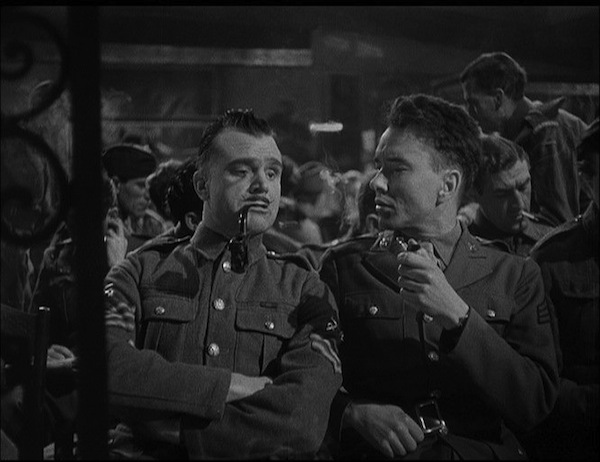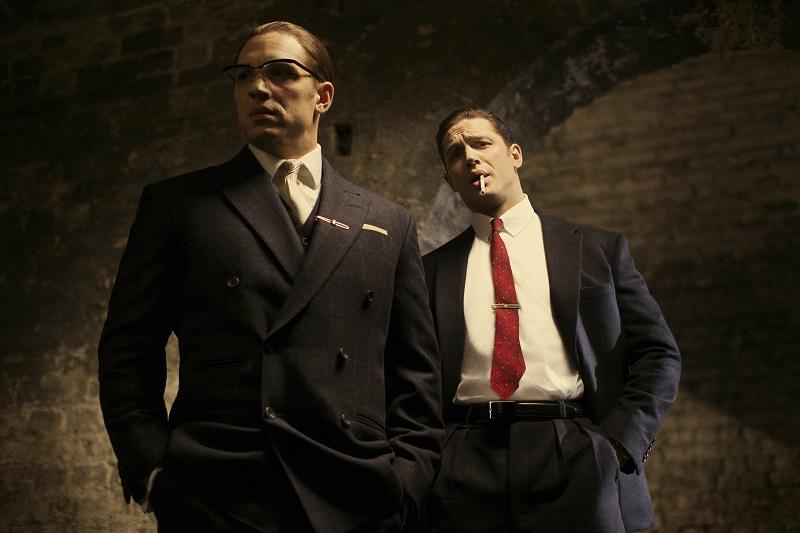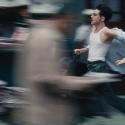This week Legend opened in cinemas starring Tom Hardy and Tom Hardy. The actor’s double turn as the Kray twins is only the latest in a surprisingly long tradition of actors taking more than one role in a film. To show off their range, and give the audience a bit of fun, actors have doubled (or trebled, or more) up as twins, siblings, parents and children, doppelgängers and often characters who are entirely unrelated. For this edition of Listed, theartsdesk revisits some of the stellar turns by those actors taking more than one credit in the cast list.
 Deborah Kerr, The Life and Death of Colonel Blimp (1943)
Deborah Kerr, The Life and Death of Colonel Blimp (1943)
Kerr was 20 when she replaced the pregnant Wendy Hiller to play three “uncannily” identical women in Michael Powell and Emeric Pressburger’s masterpiece. In 1902, Boer War hero Lieutenant Clive Wynne-Candy, V.C. (Roger Livesey) falls for Edith Hunter (Kerr), an imperious English governess, after she summons him to Berlin to defend British honour – but she marries his German duelling rival and friend, Theo (Anton Walbrook). Gripped by his unrequitable love, Candy is thunderstruck by the sight of a demure nurse, Barbara Wynne, Edith’s mirror image, whom he glimpses on the Western Front in 1918 and seeks her out after the war. Appearing in the 1943 framing sequences, the brash A.T.S. driver Angela “Johnny” Cannon was hired by Home Guard general Candy, by now a widower, because she, too, reincarnates Edith. There’s morbidity and more than a hint of red-hair fetishism in her eternal recurrence. Powell was in love with Kerr, his Romantic ideal – and it shows. Graham Fuller
 Esmond Knight, A Canterbury Tale (1943)
Esmond Knight, A Canterbury Tale (1943)
Actor Esmond Knight (pictured left with John Sweet) was blinded in action when serving as a gunnery officer aboard HMS Prince of Wales during its engagement with the Bismarck in May 1941. He was partially recovering his sight when he took three roles in Powell and Pressburger’s mystical wartime “whydunnit?” about the over-zealous attempts of Thomas Colpeper (Eric Portman), a rural Kent J.P., to draw attention to England’s neglected folkloric heritage during World War II. Knight liltingly narrates Chaucer’s” “Prologue” as the medieval pilgrims approach Canterbury in the opening sequence and plays the soldier from Seven Sisters, London, who – before Colpeper’s lantern-slide lecture – heartily befriends the American sergeant from Three Sisters, Oregon. Finally, in the expressionistically lit scene that follows the lecture, he is the stuttering village idiot unfeelingly teased by the G.I. and his fellow modern pilgrims, a landgirl and an English sergeant. The sum of Knight’s parts adds immeasurably to the film’s indelible strangeness. He later played the movie director in Peeping Tom (1960) – a typical Powellian joke about “vision”. Graham Fuller
Alec Guinness, Kind Hearts and Coronets (1949)
The mother and father of the doppelgänger school. Alec Guinness plays no fewer than eight members of the aristocratic D'Ascoyne family (nine if you count another in flashback) in this deliciously dark Ealing Studios comedy, regularly voted in the top 100 movies of all time and an acidic take on the British class system. Guinness was due to play four parts but loved the script so much that he agreed to play the lot, including Lady Agatha. Veronica Lee
Roger Moore, The Man Who Haunted Himself (1970)
The double lead in Basil Dearden's hokey thriller riffing on psychosis was Roger Moore’s first role after The Saint, and before he went on to The Persuaders! and 007. It required some actual acting chops. Moore played Harold Pelham, a man who after recovering from a car crash mystifyingly finds his exact doppelganger has stolen his marriage and indeed his whole life. Moore has never been less like polished teak. Nice moustache too. Jasper Rees
Jeremy Irons, Dead Ringers (1988)
Jeremy Irons thanked director David Cronenberg when he won the 1991 Best Actor Oscar for Reversal of Fortune even though Cronenberg had nothing whatsoever to do with that subsequent film, which was in fact directed by Barbet Schroeder. But the reasoning behind Irons's shout-out was clear: playing twin Toronto gynaecologists skirting madness and wreaking psychic and physical mayhem, Irons was at the top of his considerable form in Cronenberg's deeply disturbing movie, even if the Academy chose not to nominate this performance, thereby making up for it with the trophy itself a few years later. The actor himself knew better: his work in Dead Ringers really is best. Matt Wolf
Irène Jacob, The Double Life of Véronique (1991)
 Irène Jacob won the best actress prize in Cannes for her delicately delineated turn as both Polish choral singer Weronika and her French doppelgänger Véronique, a music teacher who observes that "all my life I've felt that I was here and somewhere else at the same time". The two women don’t know each other and share the screen for a few seconds only, yet Jacob suggests an almost spiritual connection between them that traverses distance and logic, and endures even when tragedy strikes. It’s a mysterious, wondrous film, which could have simply come across as batty were it not for Jacob’s intensely palpable performance. The Swiss actress was integral to the great Polish director Krzysztof Kieslowski’s move onto the international stage, also starring in his Three Colours: Red. Demetrios Matheou
Irène Jacob won the best actress prize in Cannes for her delicately delineated turn as both Polish choral singer Weronika and her French doppelgänger Véronique, a music teacher who observes that "all my life I've felt that I was here and somewhere else at the same time". The two women don’t know each other and share the screen for a few seconds only, yet Jacob suggests an almost spiritual connection between them that traverses distance and logic, and endures even when tragedy strikes. It’s a mysterious, wondrous film, which could have simply come across as batty were it not for Jacob’s intensely palpable performance. The Swiss actress was integral to the great Polish director Krzysztof Kieslowski’s move onto the international stage, also starring in his Three Colours: Red. Demetrios Matheou
Patricia Arquette, Lost Highway (1997)
Unspooling on a Möbius strip, David Lynch's psychoanalytic neo-noir pulp thriller gave Patricia Arquette the juicy role of a bifurcated Oedipal phantom. In the film’s “reality”, she is Renee, the remote and possibly adulterous brunette wife butchered (maybe) in a jealous rage by her impotent saxophonist husband, Fred Madison (Bill Pullman); her looks recall "the Blue Dahlia" murder victim Elizabeth Short. In Fred's febrile masochistic fantasies, Arquette is Alice, the slutty blonde moll of a ferocious (potentially castrating) gangster, but Fred has her rut with his young mechanic alter ego, which makes him feel virile again. “You’ll never have me,” Alice taunts, slipping into the ether, yet she’s always there to be accessed on the pornographic loop in Fred's mind. Arquette’s dreamy portrayal of Renee/Alice emphasizes the wilful refusal or inability of developmentally arrested males to overcome the sexual paranoia that they perversely enjoy. Graham Fuller
Lindsay Lohan, The Parent Trap (1998)
Lindsay Lohan inherited the role from Hayley Mills, who took the leads in the 1960 original and a sequel. The film is based on the book by Erich Kästner, who more famously wrote Emil and the Detectives. Lohan plays a pair of wealthy twins separated at birth, each to be brought up by their divorced parents, one in England, the other in the US. They meet at summer camp and plot to switch places in order to reunite the family. In tribute to her predecessor, one of the girls was called Hallie. After Mean Girls, this was Lohan’s most delightful moment on screen, and proved a favourite with young girls who like a bit of pep in their wholesome tween heroines. Jasper Rees
Ralph Fiennes, Sunshine (2000)
István Szabó’s baggy three-hour epic chronicles a century in the life of a middle-class Jewish family in Hungary. Ralph Fiennes hopped from one lead to the next: a high-flying judge of the Hapsburg Empire who Magyarises his surname, then an Olympic fencer who converts to Catholicism before dying in the Holocaust, then a devoutly vengeful Stalinist who has a crisis of conscience. Not quite as rib-tickling as Fiennes's next Hungarian foray in The Grand Budapest Hotel. Jasper Rees
Armie Hammer, The Social Network (2010)
Though he failed to electrify as Illya Kuryakin, Armie Hammer became an intriguing cinematic footnote via his portrayal of identical twins Tyler and Cameron Winklevoss in David Fincher's Facebook movie. The Winklevosses created the social media site ConnectU, which (they alleged, litigiously) Facebook had plagiarised. Hammer smoothly conveyed the Winkleboys' aura of moneyed, Ivy League superiority, but yet more fascinating was the the complex technology (involving stand-in actor Josh Pence) employed to create the binary Winklevosses. Very appropriate for a story about the digital media revolution. Adam Sweeting















Add comment